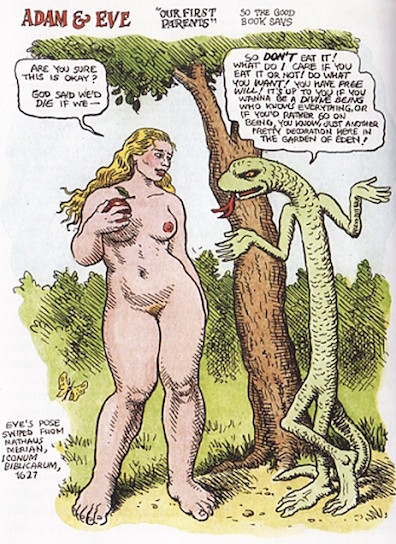
R. Crumb's representation of the biblical
story.
Source: iamyouasheisme.wordpress.com.
Be as gods
Imagining the umbilical cords of generations of humans ("strandentwining cable of all flesh") reaching back to Eden, Stephen supposes that this is "why mystic monks" gaze in their navels: the umbilicus leads back to godhead. He conflates this yogic omphaloskepsis with the biblical passage in which the serpent convinces Eve that she will become godlike if she eats the forbidden fruit: "Will you be as gods?"
In Genesis 3:4-5 the subtle serpent asks the woman about God's command not to eat the fruit of one tree and says, "Ye shall not surely die: For God doth know that in the day ye eat thereof, then your eyes shall be opened, and ye shall be as gods, knowing good and evil."
In book 9 of Paradise Lost, John Milton elaborately dramatized this simple encounter. Satan enters the body of the serpent, winds his sinuous way to the place where Eve is gardening, and addresses her flatteringly as "A goddess among gods, adored and served / By angels numberless, thy daily train" (547-48). Astonished to hear a mere animal speaking, she asks the snake how he has come by his eloquence, and he says that once, like other beasts, he had "abject thoughts and low" (572), but the fruit of a certain tree brought about "Strange alteration in me," endowing him with reason, speech, and "speculations high" (599-602). He leads her to the tree, and overcomes her reluctance by arguing that God gave his command "to keep ye low and ignorant, / His worshippers; he knows that in the day / Ye eat thereof . . . ye shall be as gods, / Knowing both good and evil as they know. / That ye should be as gods, since I as man, / Internal man, is but proportion meet, / I of brute human, ye of human gods" (704-12).
The impulse to self-divinization, largely unencumbered by Christian taboos of obedience, humility, and veneration, enters the novel through several channels, at least one of them Christian: the revivalist preaching of John Alexander Dowie.